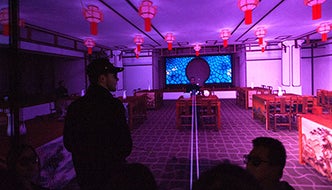There are many reasons Rensselaer students want to learn Chinese: to compete in a global job market, to study abroad, to connect with their heritage.
With an innovative and multifaceted new pedagogy now under development—one that combines the best traditional classroom teaching with a futuristic, immersive learning experience—Rensselaer students will be even better positioned to become the global, technological leaders of tomorrow.

Assistant Professor Yalun Zhou guided students at the Mandarin Project demo.
Leading the re-established Chinese language program are two new educators, assistant professor Yalun Zhou and lecturer Jianling Yue, who will oversee the Chinese minor offering within the School of Humanities, Arts, and Social Sciences.
“Yalun Zhou and Jianling Yue are invaluable resources as we work toward the important goal of strengthening the Chinese language program at Rensselaer. Language education is a crucial component of the work Rensselaer is doing today to educate the students who will become the global leaders of tomorrow,” said Mary Simoni, dean of the School of Humanities, Arts, and Social Sciences. “Yalun and Jianling’s shared expertise in developing advanced pedagogies, combined with the innovative work being done elsewhere on campus, will set our students up to successfully master Chinese language within the context of Chinese culture.”
Yue and Zhou have taught Chinese in a variety of settings—at high schools and colleges, in traditional classrooms, and in massive online classrooms. Since joining the Rensselaer faculty, both professors are taking what they’ve learned in a career of teaching Chinese as a foreign language and applying it to create an advanced pedagogy that complements and augments the Rensselaer educational experience.
Zhou taught traditional Chinese courses at the University of Missouri at Kansas City. From there she went on to direct the online program of the Confucius Institute at Michigan State University; the five-year curriculum utilizes technology and massively multiplayer online role-playing games taught students from 22 states and several countries Chinese in an immersive, but 2-D, environment.
Yue has many years experience teaching Chinese language and culture at Kansas State University and at the Defense Language Institute, an intensive program during which students are in language courses for six to seven hours each day.
Yue and Zhou will teach Chinese to Rensselaer students in an immersive classroom environment and their curriculum will also include a virtual reality component—known as the Mandarin Project—that will allow students to use their new language skills within a virtual environment that mimics Beijing. They will interact with synthetic characters speaking Chinese and be tasked with unraveling mysteries that require their knowledge of Chinese language and culture.
That project, the first client of the Emergent Reality Lab in the Rensselaer Technology Park, is being led by professors Lee Sheldon and Ben Chang with input from both Yue and Zhou.
Yue and Zhou agree that giving students the opportunity to use a new language in a cultural and conversational context is the best way for them to acquire the new skill. Between the immersive classroom lessons—during which the professors will speak almost entirely in Chinese to the students—and their work in the Mandarin Project, “we’re giving students the sense that they’re functioning in the language,” Yue said. “Without the opportunity to use their knowledge of Chinese culture and language, they won’t gain skills,” she added.
Drawing on their extensive teaching experience, both women are confident that the dual experiences being offered to Rensselaer students will give students an advantage when they are speaking Chinese in a real-life situation. “It’s really very exciting to imagine how well our students will be able to interact in real environments,” Zhou said. “I believe they will be more competent in interacting in real-life situations than students who will learn solely from books.”
“For students learning Chinese through textbooks and maybe some online material with an instructor in a classroom, they don’t have a real sense of Chinese society, the culture presence. But with the lab they will have a near-real experience,” Zhou said.


